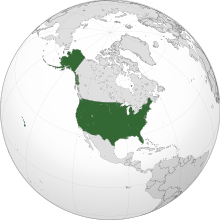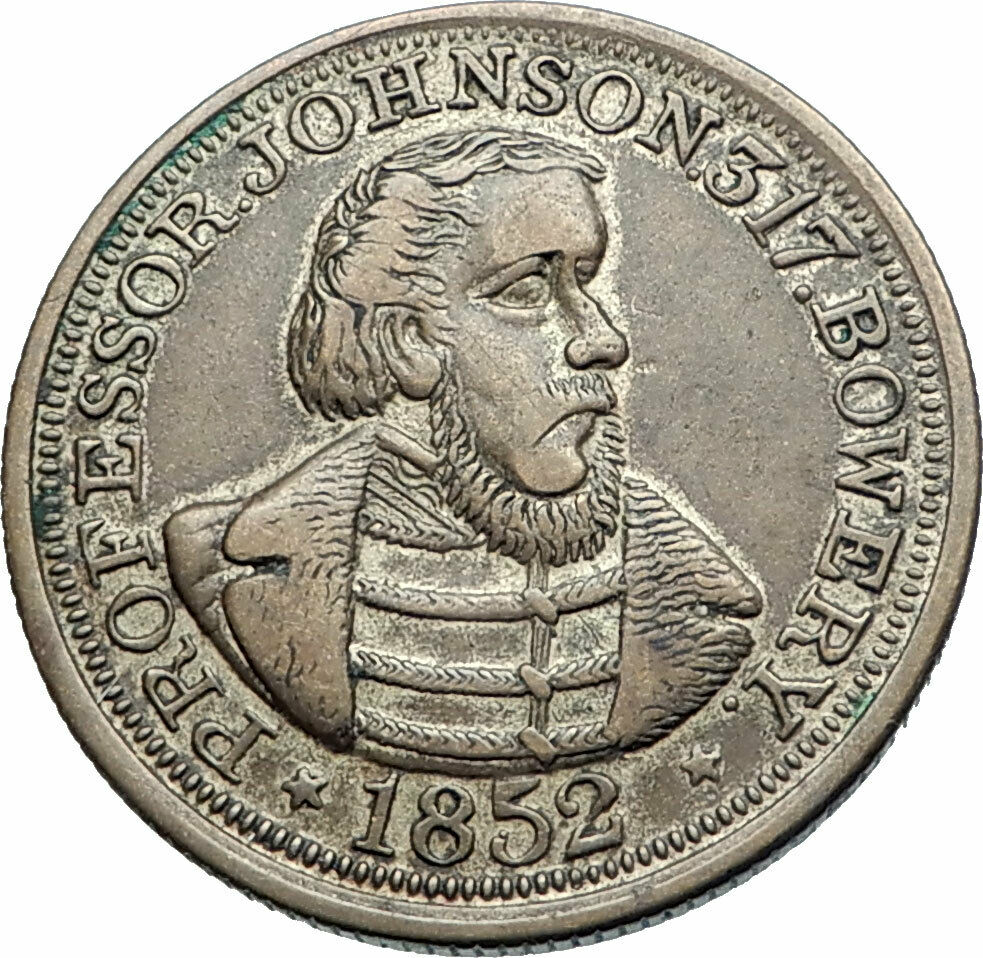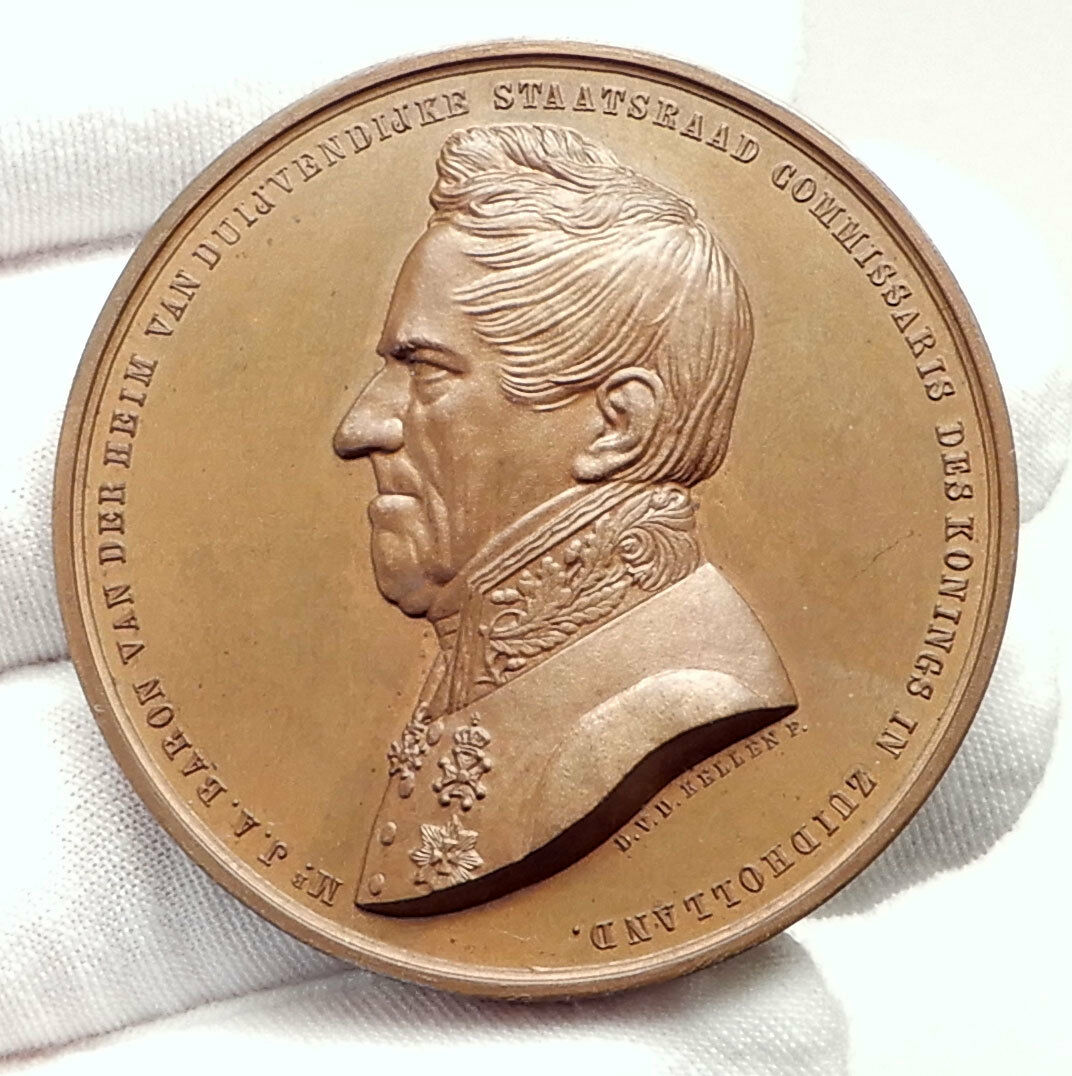|
United States of America
Franklin Mint ANCS Series – Ira Frederick Aldridge
1972 Proof Silver Medal 39mm (26.61 grams) Sterling Silver
Reference: Franklin Mint 0581 | Sculptor: Philip R. Nathan
IRA FREDERICK ALDRIDGE c1807-1867 NATHAN, Ira facing 1/2 left.
SHAKESPEAREAN ACTOR, Theatre masks, one happy, one angry.
Edge Lettering:
STERLING 72 P 0851
You are bidding on the exact item pictured, provided with a Certificate of Authenticity and Lifetime Guarantee of Authenticity.
,_in_the_character_of_Othello,_Attributed_to_James_Northcote_(1746-1831).jpg/220px-Ira_Aldridge_(1807-1867),_in_the_character_of_Othello,_Attributed_to_James_Northcote_(1746-1831).jpg) Ira Frederick Aldridge (July 24, 1807 – August 7, 1867) was an American actor, playwright, and theatre manager, who made his career after 1824 largely on the London stage and in Europe, especially in Shakespearean roles. Born in New York City, Aldridge is the only actor of African-American descent among the thirty-three actors of the English stage honoured with bronze plaques at the Shakespeare Memorial Theatre at Stratford-upon-Avon. Aldridge’s acting career took off at the height of the movement to abolish slavery. He chose to play a number of anti-slavery roles and often addressed his audiences on closing night, speaking passionately about the injustice of slavery, as did other touring Black abolitionists such as Frederick Douglass. Ira Frederick Aldridge (July 24, 1807 – August 7, 1867) was an American actor, playwright, and theatre manager, who made his career after 1824 largely on the London stage and in Europe, especially in Shakespearean roles. Born in New York City, Aldridge is the only actor of African-American descent among the thirty-three actors of the English stage honoured with bronze plaques at the Shakespeare Memorial Theatre at Stratford-upon-Avon. Aldridge’s acting career took off at the height of the movement to abolish slavery. He chose to play a number of anti-slavery roles and often addressed his audiences on closing night, speaking passionately about the injustice of slavery, as did other touring Black abolitionists such as Frederick Douglass.
He was especially popular in Prussia and Russia, where he received top honours from heads of state. At the time of his sudden death, while on tour in Poland, he was arranging a triumphant return to America, with a planned 100-show tour to the United States. Aldridge married twice, once to an Englishwoman, once to a Swedish woman, and had a family in England. Two of his daughters became professional opera singers.
Ira Aldridge is considered with James Hewlett the first Black tragedian. Aldridge is an icon of the African-American theater and a source of inspiration for many artists of African descent, such as Denzel Washington, who played the role of Macbeth in Joel Coen’s recent film The Tragedy of Macbeth. Aldridge is also considered as one of the leaders of the anti-slavery movement.
 The United States of America (USA), commonly known as the United States (U.S. or US) or America, is a country composed of 50 states, a federal district, five major self-governing territories, and various possessions. At 3.8 million square miles (9.8 million km2), the United States is the world’s third or fourth largest country by total area and is slightly smaller than the entire continent of Europe’s 3.9 million square miles (10.1 million km2). With a population of over 327 million people, the U.S. is the third most populous country. The capital is Washington, D.C., and the largest city by population is New York City. Forty-eight states and the capital’s federal district are contiguous in North America between Canada and Mexico. The State of Alaska is in the northwest corner of North America, bordered by Canada to the east and across the Bering Strait from Russia to the west. The State of Hawaii is an archipelago in the mid-Pacific Ocean. The U.S. territories are scattered about the Pacific Ocean and the Caribbean Sea, stretching across nine official time zones. The extremely diverse geography, climate, and wildlife of the United States make it one of the world’s 17 megadiverse countries. The United States of America (USA), commonly known as the United States (U.S. or US) or America, is a country composed of 50 states, a federal district, five major self-governing territories, and various possessions. At 3.8 million square miles (9.8 million km2), the United States is the world’s third or fourth largest country by total area and is slightly smaller than the entire continent of Europe’s 3.9 million square miles (10.1 million km2). With a population of over 327 million people, the U.S. is the third most populous country. The capital is Washington, D.C., and the largest city by population is New York City. Forty-eight states and the capital’s federal district are contiguous in North America between Canada and Mexico. The State of Alaska is in the northwest corner of North America, bordered by Canada to the east and across the Bering Strait from Russia to the west. The State of Hawaii is an archipelago in the mid-Pacific Ocean. The U.S. territories are scattered about the Pacific Ocean and the Caribbean Sea, stretching across nine official time zones. The extremely diverse geography, climate, and wildlife of the United States make it one of the world’s 17 megadiverse countries.
.svg/85px-Great_Seal_of_the_United_States_(obverse).svg.png) Paleo-Indians migrated from Siberia to the North American mainland at least 12,000 years ago. European colonization began in the 16th century. The United States emerged from the thirteen British colonies established along the East Coast. Numerous disputes between Great Britain and the colonies following the French and Indian War led to the American Revolution, which began in 1775, and the subsequent Declaration of Independence in 1776. The war ended in 1783 with the United States becoming the first country to gain independence from a European power. The current constitution was adopted in 1788, with the first ten amendments, collectively named the Bill of Rights, being ratified in 1791 to guarantee many fundamental civil liberties. The United States embarked on a vigorous expansion across North America throughout the 19th century, acquiring new territories, displacing Native American tribes, and gradually admitting new states until it spanned the continent by 1848. Paleo-Indians migrated from Siberia to the North American mainland at least 12,000 years ago. European colonization began in the 16th century. The United States emerged from the thirteen British colonies established along the East Coast. Numerous disputes between Great Britain and the colonies following the French and Indian War led to the American Revolution, which began in 1775, and the subsequent Declaration of Independence in 1776. The war ended in 1783 with the United States becoming the first country to gain independence from a European power. The current constitution was adopted in 1788, with the first ten amendments, collectively named the Bill of Rights, being ratified in 1791 to guarantee many fundamental civil liberties. The United States embarked on a vigorous expansion across North America throughout the 19th century, acquiring new territories, displacing Native American tribes, and gradually admitting new states until it spanned the continent by 1848.
 During the second half of the 19th century, the Civil War led to the abolition of slavery. By the end of the century, the United States had extended into the Pacific Ocean, and its economy, driven in large part by the Industrial Revolution, began to soar. The Spanish-American War and World War I confirmed the country’s status as a global military power. The United States emerged from World War II as a global superpower, the first country to develop nuclear weapons, the only country to use them in warfare, and a permanent member of the United Nations Security Council. The Rights Acts of 1964, 1965 and 1968 outlaws discrimination based on race or color. During the Cold War, the United States and the Soviet Union competed in the Space Race, culminating with the 1969 U.S. Moon landing. The end of the Cold War and the collapse of the Soviet Union in 1991 left the United States as the world’s sole superpower. During the second half of the 19th century, the Civil War led to the abolition of slavery. By the end of the century, the United States had extended into the Pacific Ocean, and its economy, driven in large part by the Industrial Revolution, began to soar. The Spanish-American War and World War I confirmed the country’s status as a global military power. The United States emerged from World War II as a global superpower, the first country to develop nuclear weapons, the only country to use them in warfare, and a permanent member of the United Nations Security Council. The Rights Acts of 1964, 1965 and 1968 outlaws discrimination based on race or color. During the Cold War, the United States and the Soviet Union competed in the Space Race, culminating with the 1969 U.S. Moon landing. The end of the Cold War and the collapse of the Soviet Union in 1991 left the United States as the world’s sole superpower.
The United States is the world’s oldest surviving federation. It is a federal republic and a representative democracy. The United States is a founding member of the United Nations, World Bank, International Monetary Fund, Organization of American States (OAS), and other international organizations. The United States is a highly developed country, with the world’s largest economy by nominal GDP and second-largest economy by PPP, accounting for approximately a quarter of global GDP. The U.S. economy is largely post-industrial, characterized by the dominance of services and knowledge-based activities, although the manufacturing sector remains the second-largest in the world. The United States is the world’s largest importer and the second largest exporter of goods, by value. Although its population is only 4.3% of the world total, the U.S. holds 31% of the total wealth in the world, the largest share of global wealth concentrated in a single country.
Despite wide income and wealth disparities, the United States continues to rank very high in measures of socioeconomic performance, including average wage, human development, per capita GDP, and worker productivity. The United States is the foremost military power in the world, making up a third of global military spending, and is a leading political, cultural, and scientific force internationally.
|







,_in_the_character_of_Othello,_Attributed_to_James_Northcote_(1746-1831).jpg/220px-Ira_Aldridge_(1807-1867),_in_the_character_of_Othello,_Attributed_to_James_Northcote_(1746-1831).jpg) Ira Frederick Aldridge (July 24, 1807 – August 7, 1867) was an American actor, playwright, and theatre manager, who made his career after 1824 largely on the London stage and in Europe, especially in Shakespearean roles. Born in New York City, Aldridge is the only actor of African-American descent among the thirty-three actors of the English stage honoured with bronze plaques at the Shakespeare Memorial Theatre at Stratford-upon-Avon. Aldridge’s acting career took off at the height of the movement to abolish slavery. He chose to play a number of anti-slavery roles and often addressed his audiences on closing night, speaking passionately about the injustice of slavery, as did other touring Black abolitionists such as Frederick Douglass.
Ira Frederick Aldridge (July 24, 1807 – August 7, 1867) was an American actor, playwright, and theatre manager, who made his career after 1824 largely on the London stage and in Europe, especially in Shakespearean roles. Born in New York City, Aldridge is the only actor of African-American descent among the thirty-three actors of the English stage honoured with bronze plaques at the Shakespeare Memorial Theatre at Stratford-upon-Avon. Aldridge’s acting career took off at the height of the movement to abolish slavery. He chose to play a number of anti-slavery roles and often addressed his audiences on closing night, speaking passionately about the injustice of slavery, as did other touring Black abolitionists such as Frederick Douglass. The United States of America (USA), commonly known as the United States (U.S. or US) or America, is a country composed of 50 states, a federal district, five major self-governing territories, and various possessions. At 3.8 million square miles (9.8 million km2), the United States is the world’s third or fourth largest country by total area and is slightly smaller than the entire continent of Europe’s 3.9 million square miles (10.1 million km2). With a population of over 327 million people, the U.S. is the third most populous country. The capital is Washington, D.C., and the largest city by population is New York City. Forty-eight states and the capital’s federal district are contiguous in North America between Canada and Mexico. The State of Alaska is in the northwest corner of North America, bordered by Canada to the east and across the Bering Strait from Russia to the west. The State of Hawaii is an archipelago in the mid-Pacific Ocean. The U.S. territories are scattered about the Pacific Ocean and the Caribbean Sea, stretching across nine official time zones. The extremely diverse geography, climate, and wildlife of the United States make it one of the world’s 17 megadiverse countries.
The United States of America (USA), commonly known as the United States (U.S. or US) or America, is a country composed of 50 states, a federal district, five major self-governing territories, and various possessions. At 3.8 million square miles (9.8 million km2), the United States is the world’s third or fourth largest country by total area and is slightly smaller than the entire continent of Europe’s 3.9 million square miles (10.1 million km2). With a population of over 327 million people, the U.S. is the third most populous country. The capital is Washington, D.C., and the largest city by population is New York City. Forty-eight states and the capital’s federal district are contiguous in North America between Canada and Mexico. The State of Alaska is in the northwest corner of North America, bordered by Canada to the east and across the Bering Strait from Russia to the west. The State of Hawaii is an archipelago in the mid-Pacific Ocean. The U.S. territories are scattered about the Pacific Ocean and the Caribbean Sea, stretching across nine official time zones. The extremely diverse geography, climate, and wildlife of the United States make it one of the world’s 17 megadiverse countries. .svg/85px-Great_Seal_of_the_United_States_(obverse).svg.png) Paleo-Indians migrated from Siberia to the North American mainland at least 12,000 years ago. European colonization began in the 16th century. The United States emerged from the thirteen British colonies established along the East Coast. Numerous disputes between Great Britain and the colonies following the French and Indian War led to the American Revolution, which began in 1775, and the subsequent Declaration of Independence in 1776. The war ended in 1783 with the United States becoming the first country to gain independence from a European power. The current constitution was adopted in 1788, with the first ten amendments, collectively named the Bill of Rights, being ratified in 1791 to guarantee many fundamental civil liberties. The United States embarked on a vigorous expansion across North America throughout the 19th century, acquiring new territories, displacing Native American tribes, and gradually admitting new states until it spanned the continent by 1848.
Paleo-Indians migrated from Siberia to the North American mainland at least 12,000 years ago. European colonization began in the 16th century. The United States emerged from the thirteen British colonies established along the East Coast. Numerous disputes between Great Britain and the colonies following the French and Indian War led to the American Revolution, which began in 1775, and the subsequent Declaration of Independence in 1776. The war ended in 1783 with the United States becoming the first country to gain independence from a European power. The current constitution was adopted in 1788, with the first ten amendments, collectively named the Bill of Rights, being ratified in 1791 to guarantee many fundamental civil liberties. The United States embarked on a vigorous expansion across North America throughout the 19th century, acquiring new territories, displacing Native American tribes, and gradually admitting new states until it spanned the continent by 1848.  During the second half of the 19th century, the Civil War led to the abolition of slavery. By the end of the century, the United States had extended into the Pacific Ocean, and its economy, driven in large part by the Industrial Revolution, began to soar. The Spanish-American War and World War I confirmed the country’s status as a global military power. The United States emerged from World War II as a global superpower, the first country to develop nuclear weapons, the only country to use them in warfare, and a permanent member of the United Nations Security Council. The Rights Acts of 1964, 1965 and 1968 outlaws discrimination based on race or color. During the Cold War, the United States and the Soviet Union competed in the Space Race, culminating with the 1969 U.S. Moon landing. The end of the Cold War and the collapse of the Soviet Union in 1991 left the United States as the world’s sole superpower.
During the second half of the 19th century, the Civil War led to the abolition of slavery. By the end of the century, the United States had extended into the Pacific Ocean, and its economy, driven in large part by the Industrial Revolution, began to soar. The Spanish-American War and World War I confirmed the country’s status as a global military power. The United States emerged from World War II as a global superpower, the first country to develop nuclear weapons, the only country to use them in warfare, and a permanent member of the United Nations Security Council. The Rights Acts of 1964, 1965 and 1968 outlaws discrimination based on race or color. During the Cold War, the United States and the Soviet Union competed in the Space Race, culminating with the 1969 U.S. Moon landing. The end of the Cold War and the collapse of the Soviet Union in 1991 left the United States as the world’s sole superpower. 




